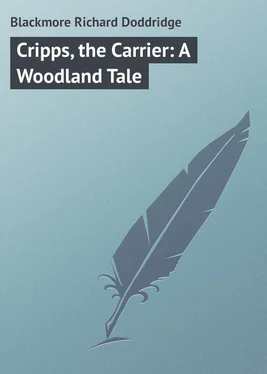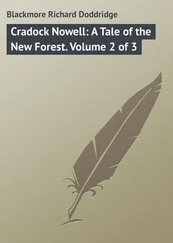Richard Blackmore - Cripps, the Carrier - A Woodland Tale
Здесь есть возможность читать онлайн «Richard Blackmore - Cripps, the Carrier - A Woodland Tale» — ознакомительный отрывок электронной книги совершенно бесплатно, а после прочтения отрывка купить полную версию. В некоторых случаях можно слушать аудио, скачать через торрент в формате fb2 и присутствует краткое содержание. ISBN: , Жанр: foreign_prose, на английском языке. Описание произведения, (предисловие) а так же отзывы посетителей доступны на портале библиотеки ЛибКат.
- Название:Cripps, the Carrier: A Woodland Tale
- Автор:
- Жанр:
- Год:неизвестен
- ISBN:http://www.gutenberg.org/ebooks/43281
- Рейтинг книги:4 / 5. Голосов: 1
-
Избранное:Добавить в избранное
- Отзывы:
-
Ваша оценка:
- 80
- 1
- 2
- 3
- 4
- 5
Cripps, the Carrier: A Woodland Tale: краткое содержание, описание и аннотация
Предлагаем к чтению аннотацию, описание, краткое содержание или предисловие (зависит от того, что написал сам автор книги «Cripps, the Carrier: A Woodland Tale»). Если вы не нашли необходимую информацию о книге — напишите в комментариях, мы постараемся отыскать её.
Cripps, the Carrier: A Woodland Tale — читать онлайн ознакомительный отрывок
Ниже представлен текст книги, разбитый по страницам. Система сохранения места последней прочитанной страницы, позволяет с удобством читать онлайн бесплатно книгу «Cripps, the Carrier: A Woodland Tale», без необходимости каждый раз заново искать на чём Вы остановились. Поставьте закладку, и сможете в любой момент перейти на страницу, на которой закончили чтение.
Интервал:
Закладка:
"Perhaps I do; I have no more time to talk of that, or any other thing. I shall hurry into Oxford, and see John Smith, and let everybody know of it. What do I care what people think? Send a man on horseback to Beckley at once. Have you any man worth a pinch of salt? You are always changing so."
"I cannot keep cripples, or sots, dear brother. Take any one you please of them."
"Any one who will deign to come, you should say. Deep snow tries the mettle of new-comers."
CHAPTER VI.
THE PUBLIC OF THE "PUBLIC."
Meanwhile, Esther Cripps, who perhaps could have thrown some light on this strange affair, was very uneasy in her mind. She had not heard, of course, as yet, that Grace Oglander was missing. But she could not get rid of the fright she had felt, and the dread of some dark secret. Her sister-in-law was in such a condition that she must not be told of it; and as for her brother Exodus, it would be worse than useless to speak to him. He had taken it into his head, ever since that business with the "College gent," that his sister was not "right-minded" – that she dreamed things, and imagined things; and that anything she liked to say should be listened to, and thought no more of. And Baker Cripps was one of those men from whose minds no hydraulic power can lift an idea – laid once, laid for ever.
Esther had no one to tell her tale to. She longed to be home at Beckley; but there had been such symptoms with the baker's wife, that a woman, of the largest experience to be found in Oxford, declared that there was another coming. This was not so. But still (as all the women said) it might have been; and where was the man to lay down the law to them that had been through it?
The whole of this was made quite right in the end and everybody satisfied; but it prevented poor Esther from going to the Golden Cross, as she should have done; and the Carrier (having a little tiff with his brother about a sack of meal, as long ago as Michaelmas) left him to bake his own bread, and would rather drive over his dinner than dine with him.
The days of the week are hard to follow, as everybody must have long found out; but still, from Tuesday to Saturday is a considerable time to think of. Master Cripps had two carrying days, two great days of long voyaging. Not that he refrained from coasting here and there about the parish, or up and down a lane or two, on days of briefer enterprise; or refused to take some washings round; for he was not the man to be ashamed of earning sixpence honourably.
But now such weather had set in, that even Cripps, with his active turn and pride in his honest calling, was forced to stay at home and boil the bones the butcher sent him, and nurse his stiff knee, and smoke his pipe, and go no further than his bed of hardy kail, or Dobbin's stable. Except that when the sun went down – if it ever got up, for aught he knew – his social instincts so awoke, that he managed to go to the corner of the lane, where the blacksmith kept the "public-house." This was a most respectable house, frequented very quietly. Master Cripps, from his intercourse with the world, and leading position in Beckley, as well as his pleasant way of letting other people talk, and nodding when their words were wisdom – Cripps had long been accepted as the oracle; and he liked it.
Even there – in his brightest moments, when he smoked his pipe and thought, leaving emptier folk to waste the income of their brain in words, and even when he had been roused up to settle some vast question by a brief emphatic utterance – his satisfaction was now alloyed. Not from any threat of rival wisdom – that was hopeless – but from the universal call for a guiding judgment from him. The whole of Beckley village now was more upset than had been known for thirty years and upward. Ever since Napoleon had been expected to encamp at Carfax, and all the University went into white gaiters against him, there had been no such stir of parochial mind as now was heaving. Cripps could remember the former movement, and how his father had lost wisdom by saying that nothing would come of it – whereas the greatest things came of it; the tailor was bankrupt by making breeches which the Government would not pay for, the publican bought a horse and defied his brewer on the strength of it, and the parish-clerk limped for the rest of his life through the loss of two toes when tipsy – therefore Zacchary Cripps was now determined to hide his opinion.
When the mind is in this uncertain state, it fails of receiving that consideration which it is slowly exerting. If Cripps had stood up, and rashly spoken, he must have carried all before him: whereas now he felt, and was grieved to feel, that shallow fellows were taking his place, by dint of decisive ignorance. This Friday evening, everybody, who had teeth to face the arrowy wind, came into the Dusty Anvil, well laden with enormous rumours.
Phil Hiss, the blacksmith, had a daughter, who served him as a barmaid, Amelia, or Mealy Hiss; a year or two older than Miss Oglander, and in the simple country fashion (setting birth and rank aside) a true ally and favourite. Now, some old woman in Beckley had said, as long ago as yesterday, that she could not believe but what Mealy Hiss, who dressed herself so outrageous, knew a deal more than she dared speak out concerning that wonderful unkid thing about the Squire's daughter. For her part, this old woman was sure that a young man lay at the bottom of it. Them good young ladies that went to the school, and made up soup and such-like, was not a bit better than the rest of us; and if butter wouldn't melt in their mouths, pitchforks wouldn't choke them. She would say no more, it was no concern of hers; and everybody knew what she was. But as sure as her copper burst that morning, something would come out ere long; and Mealy would be at the bottom of it!
Miss Amelia Hiss, before she lit her two tallow-candles – which never was allowed to be done till a quart of beer had been called for – knew right well that all her wits must be brought into use that evening. A young man, who had a liking for her, which she was beginning to think about, came in before his time to tell her all that Gammer Gurdon said. Wherefore she put on her new neck-ribbon (believed to have come express from London) and her agate brooch, and other most imposing properties. With the confidence of all these, she drew the ale, and kept her distance.
For an hour or so these tactics answered. Young men, old men, and good women (who came of course for their husbands' sakes), soberly took their little drop of beer, nodded to one another, and said little. Pressure lay on heart and mind; and nature's safety-valve, the tongue, was sat upon by prudence. But this, of course, could not last long. Little jerkings of short questions broke the crust of silence; lips from blowing froth of beer began to relax their grimness; eyelids that had drooped went up, and winks grew into friendly gaze; and everybody began to beg everybody's pardon less. The genial power of good ale, and the presence of old friends, were working on the solid English hearts; and every man was ready for his neighbour to say something.
Hiss, the blacksmith and the landlord, felt that on his heavy shoulders lay the duty of promoting warmth and cordiality. He sat without a coat, as usual, and his woolsey sleeves rolled back displayed the proper might of arm. In one grimy hand he held a pipe, at which he had given the final puff, and in the other a broad-rimmed penny, ready to drop it into the balance of the brass tobacco-box, and open it for a fresh supply. First he glanced at the door, to be sure that his daughter Mealy could not hear; for ever since her mother's death he had stood in some awe of Mealy; and then receiving from Zacchary Cripps a nod of grave encouragement, he fixed his eyes on him through the smoke, and uttered what all were inditing of.
Читать дальшеИнтервал:
Закладка:
Похожие книги на «Cripps, the Carrier: A Woodland Tale»
Представляем Вашему вниманию похожие книги на «Cripps, the Carrier: A Woodland Tale» списком для выбора. Мы отобрали схожую по названию и смыслу литературу в надежде предоставить читателям больше вариантов отыскать новые, интересные, ещё непрочитанные произведения.
Обсуждение, отзывы о книге «Cripps, the Carrier: A Woodland Tale» и просто собственные мнения читателей. Оставьте ваши комментарии, напишите, что Вы думаете о произведении, его смысле или главных героях. Укажите что конкретно понравилось, а что нет, и почему Вы так считаете.












